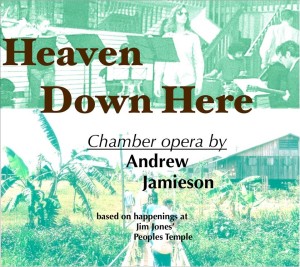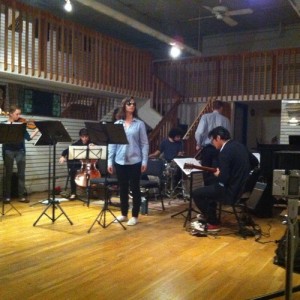 I am a composer and pianist focused on both avant-garde experimentation and gospel music, especially its role in worship. My upcoming chamber opera, Heaven Down Here, integrates the energy and spontaneity of Pentecostal worship and the rhythmic drive of gospel music with the provocative sounds of experimental music. It also delves into the difficult and important story of Peoples Temple.
I am a composer and pianist focused on both avant-garde experimentation and gospel music, especially its role in worship. My upcoming chamber opera, Heaven Down Here, integrates the energy and spontaneity of Pentecostal worship and the rhythmic drive of gospel music with the provocative sounds of experimental music. It also delves into the difficult and important story of Peoples Temple.
In addition to a musician, I am a left-leaning Christian, passionate about racial justice, connecting religion and political issues, and communal living. It is not hard to imagine myself living out these passions in Peoples Temple. Furthermore, I play piano for two Bay Area churches that belong to the Temple’s Disciples of Christ denomination. After having worked in primarily black congregations for three years as a keyboardist, I even identify with Jim Jones as a white person working for a majority-black congregation. These similarities compel me to careful study about what might have gone wrong, how to avoid repeating their mistakes, and what, if anything, about the Temple can be celebrated.
 Music is central to the way that I reflect on a topic like this. I strive to know not only how the Temple looked and felt, but how it sounded. I am recreating the literal sounds of music and speech during worship and using sound to express comfort, hope and freedom simultaneously with the experience of fear and oppression. Through music, I hope to help everyone experience emotions in the Temple in a new and deeper way.
Music is central to the way that I reflect on a topic like this. I strive to know not only how the Temple looked and felt, but how it sounded. I am recreating the literal sounds of music and speech during worship and using sound to express comfort, hope and freedom simultaneously with the experience of fear and oppression. Through music, I hope to help everyone experience emotions in the Temple in a new and deeper way.
Heaven Down Here opens with a fictional San Francisco Temple worship service from the mid 1970s before many of its members left for Guyana. Through staging, music and libretto text, I portray congregational song, testimonies, healings, and a sermon. The tone of the music emphasizes the Temple as a place of refuge and comfort, and that life in the Temple was a daring attempt to challenge injustice. At the same time, it expresses the deep fear embedded in the community, and Jones’ total authority and lack of accountability.
After this worship comes an imaginary meeting of members of the Temple planning commission. Libretto text in this act focuses on real and perceived threats that the Temple faces. At the end of this meeting, Jones learns about the August 1977 New West article that exposes the Temple’s abuse, and he decides to leave immediately for Guyana, taking along his congregation in what he characterizes as a bold escape from an oppressive society.
After the meeting comes a second imaginary worship service. There is more singing and testimonies, but the congregation is told they must make a dramatic change in order for their movement to live on. In this section, I imagine Jones “leading” worship through videotaped messages, since he has already left for Guyana, giving instructions and reasons for his congregation to leave for the “Promised Land.” He is more enticing and less accountable than ever, describing Jonestown as a place of ultimate peace and freedom, a true manifestation of “Heaven down here.” The meeting ends with the entire group of singers leaving the stage. This final moment literally depicts their escape from California to Guyana, but figuratively suggests the more deadly departure that would come a year later.
There will be about seven singers to cover the roles of different Temple leaders and members. A small jazz-style chamber ensemble with strings, winds, and a rhythm section accompanies them. The music often quotes and imitates traditional spirituals, political rally songs and gospel music that would have been familiar in the Temple, but juxtaposed with more ominous sounds. For text, I am stringing together text from various Temple tapes, and using text from media coverage which Temple members construed as an “attack.”
On July 21st, 2013, I tried out five scenes with two singers and chamber ensemble. I appreciated the performers’ heightened sensitivity in approaching this subject matter, and they made my musical ideas convincing. The audio recording of the July 21st workshop can be found here and the video here. I would love feedback from anyone who hears this music, because it will help me move forward in my composition with maximum clarity and sensitivity.
I am building off of those musical themes to compose the remaining scenes, and making changes to the existing music to help strengthen the drama and the narrative. I plan to finish composing by early spring 2014 for a full performance in the summer. It will be lightly staged with a small number of props, and I will print a DVD recording of the event afterwards. I will post updates on the project here.
(Andrew Barnes Jamieson can be reached at andrewbarnesjam@gmail.com.)